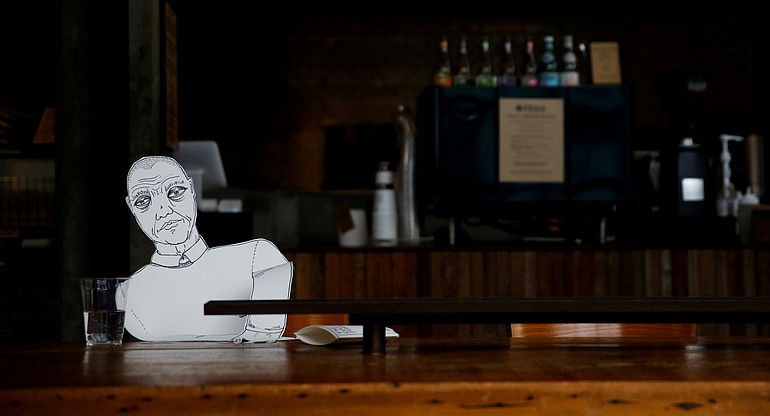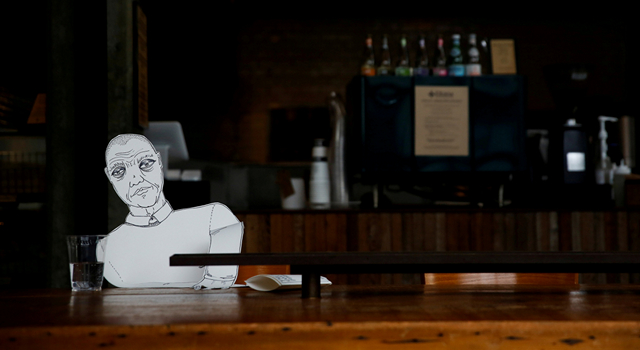By Catholic News Service - Catholic News Service

Photographer: LINDSEY WASSON
A paper cutout of a person sits at an empty table at a bagel cafe during the coronavirus pandemic in Seattle March 27, 2020. Outreach efforts by Catholic agencies continue in large part during the virus-mandated restrictions. (CNS photo/Lindsey Wasson, Reuters) See SERVICE-WORKAROUNDS March 31, 2020.
WASHINGTON (CNS) — With face-to-face service making up so much Catholic charitable work, those efforts would be stymied by such coronavirus-mandated restrictions as group-size limits and social distancing, right?
One might think so. But one would think wrong.
Outreach efforts continue in large part, but with creative twists, according to Catholic Charities affiliates and other church-run social service agencies.
In the Seattle Archdiocese, the first U.S. region where the COVID-19 pandemic struck, ingenuity has been the hallmark.
Erin Maguire, who does network building for Catholic Community Services of Western Washington, also supervises the “Prepares” program. Maguire has trained parish volunteers, called “companions,” who do a lot of “virtual visits” by phone.
Many of the oldest shelter residents in the region, over 80 years old, are now being housed in hotels if they’re healthy and asymptomatic. Maguire's group provides them meals, partnering with the archdiocese and Maryknoll.
The catering operation is supported with $10,000, raised through special fundraisers, Maguire said. That work yields its own benefit, she added: the caterers are owned by people of color who were vulnerable to losing their business.
“In this tough time, having some comfort food is a good thing,” Maguire said.
The “Prepares” program began four years ago when stores ran short on diapers, putting poor families at a disadvantage. Diapers are again in short supply, but Maguire and her workers were ready. Working with the 71 parishes in King County, which includes Seattle, they put out the call March 28 to buy diapers.
“We’re going in asking if we can take all their stock,” Maguire told Catholic News Service. Following the purchases, her assistants drop off the diapers at the stoops of parents’ homes.
In the Diocese of Spokane, Catholic Charities of Eastern Washington faced service-delivery disruptions with seniors and the homeless.
With social distancing guidelines, “we have to sleep everyone head to toe and six feet apart, so we lost half of our beds,” said CEO Rob McCann. His office coped by opening three new shelters in three weeks -- inside the existing buildings.
“We turned the lobbies into pop-up shelters," McCann said. "There’s social distance, but we still get everyone sleeping inside.”
The diocese reaped a mixed blessing from a norovirus outbreak a few years ago, McCann said. That illness required him to have "quarantine dorm rooms" built in all his apartments.
"Thank God we built those, ’cause they’re all full now," he said.
McCann's group has also launched a “Shopping Angels” initiative in which residents buy a bag of food and drop it off at Catholic Charities headquarters. Volunteers sort it and prepare food-delivery packs to vulnerable seniors unable to leave home and shop for themselves.
In a weekly email to staff and volunteers March 20, a core principle for the agency is set forth:
“We are an organization who serves those in need. We are caretakers of the poor and sitting out or sitting on the sidelines is not an option for us. It’s our job to do that precious work, and we have a sacred obligation and duty to keep doing it, as best we can, even in the current COVID-19 world.
“The poor and vulnerable will be the hardest hit by what is coming, and Catholic Charities intends to be there for them while at the same time protecting our staff and our organizational needs.”
In the Diocese of Phoenix, Jean Christofferson directs marketing for Catholic Charities Community Services. The 23 programs include family shelters, early education programs, parents-and-teachers early education program, services for veterans and for the homeless.
“It’s a kind of challenge to get all of these things changed in 48 hours,” Christofferson said. “We are operating every program but in a different way.”
With school districts in the diocese’s seven counties shuttered, the early education programs at those schools ran into a roadblock. “We would have had to close those programs,” Christofferson noted.
Instead, staffers are using Skype and Zoom to talk with parents. For those who don’t have the technology, the staffers are dropping off packets and supplies on porches, so the parents “have something to do with their kids while this is going on,” Christofferson said.
At Manna House, which provides transitional shelter for 76 homeless vets, staff can keep them isolated if they have signs of the coronavirus, she added. But the general homeless population is a tougher case. They are “probably more vulnerable than anybody right now,” Christofferson told CNS.
So staff are developing called “shoutreach” instead of outreach. Wearing gloves, masks and personal protective equipment, “we shout at them: ‘What do you need? What can we help you with?'” Christofferson said. The answers are typically food, water, and hygiene items. Staff and volunteers also try to help them with resources.
Reached by CNS March 30 — the first day of a Kansas statewide stay-at-home order — “we had to scramble to get ready,” said Debbie Snapp, executive director of Catholic Charities of Southwest Kansas, which covers the Diocese of Dodge City. “We thought we would have a little more time to do that.”
Snapp said the organization has dropped all face-to-face talks in favor of phone and teleconferencing. “All our health specialists have switched to telemed so they can continue their counseling services.”
She was literally the only one minding the store at Catholic Charities headquarters. “Somebody has to deal with the mail, deal with the bank. I’ve not done much of anything except go to my house and the office for the past three weeks.”
Copyright ©2020 Catholic News Service / U.S. Conference of Catholic Bishops. Send questions about this site to [email protected]

